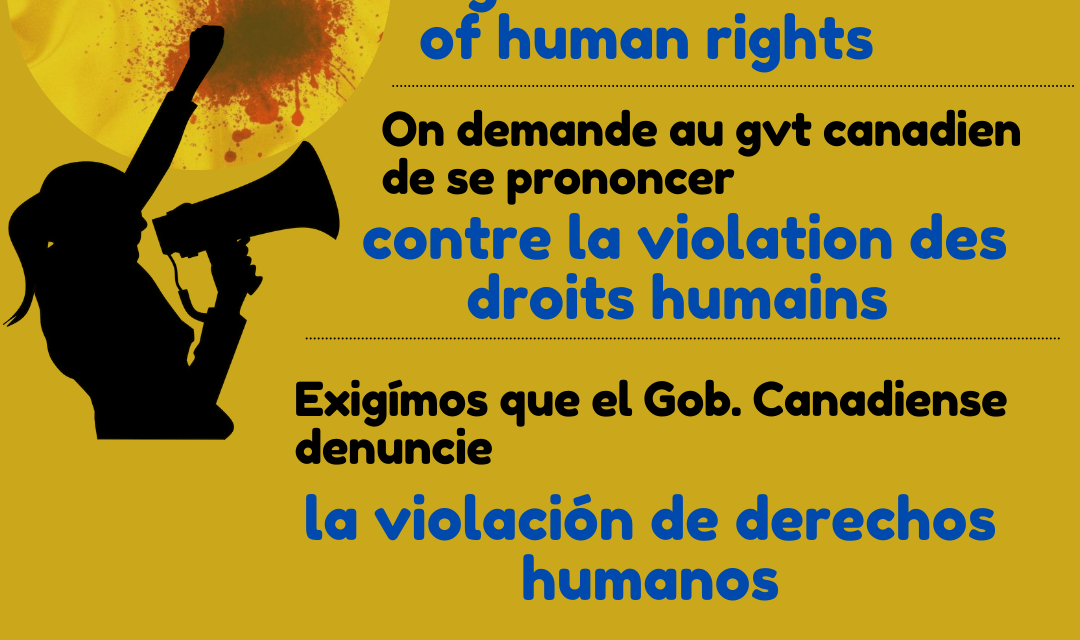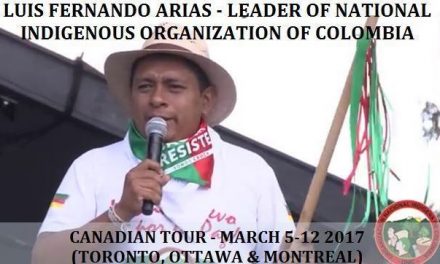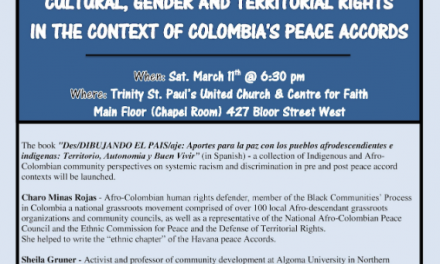Date: Tuesday, June 22, 2021 at 11:00 am
Location: Parliament Hill, Ottawa and across Canada
Facebook invite: https://fb.me/e/MJYNj8MQ
#CanadaSOSColombia
Common Frontiers joins civil society organizations to denounce the Canadian government’s inaction in light of the political crisis and severe human rights violations of protesters peacefully participating in the national strike in Colombia. In response, a Day of Action for Human Rights in Colombia will take place on June 22 at 11:00 a.m. on Parliament Hill in Ottawa and across Canada in front of the offices of federal Liberal MPs. This day of action is in solidarity with the ongoing protests in Colombia and will include performances and the presence of federal MPs.
The call for a Day of Action for Human Rights in Colombia is made by 21 Canadian-based civil society organizations working for human rights and social justice in Latin America, including international development and humanitarian NGOs, human rights organizations, trade unions, faith-based & ecumenical organizations, solidarity groups, as well as collectives of the Colombian diaspora in Canada. Notably, the organizations : Alternatives; Americas Policy Group/Groupe d’orientation politique pour les Amériques (APG-GOPA); Action et solidarité pour la Colombie (Asocol); Carrefour d’animation et participation à un monde ouvert (CAPMO); Codevelopment Canada; Collectif Paix, Territoire et Vie; Comité Ciudadano Colombian@s en Ottawa-Gatineau; Committee for Human Rights in Latin America (CDHAL); Comité de solidaridad Canadá por Colombia; Common Frontiers; CSN: Confédération des syndicats nationaux; Fonds humanitaire des Métallos/Steelworkers Humanity Fund; KAIROS: Canadian Ecumenical Justice Initiatives; MiningWatch Canada; Ola Pazifica, Vancouver; Projet d’accompagnement solidarité Colombie (PASC); Public Service Alliance of Canada(PSAC)/ L’Alliance de la Fonction publique du Canada (AFPC); United Church of Canada; @reddediasporascolombia; +57 Conexión Colombia; 21 Somos Todos – Montreal.
The Human Rights situation in Colombia: the facts
A national strike broke out in Colombia on April 28th over a now-canceled tax and health reform, as well reforms to the pension system and labour regulations. It quickly turned into a large-scale popular mobilization to denounce social inequality and police repression in the country. Since the beginning of the protests, at least 50 protesters have been killed by the Colombian National Police, 5,500 people have been arbitrarily detained, at least 500 people have been reported missing, 180 protesters have been shot and nearly 25 protesters have suffered sexual violence at the hands of the Mobile Riot Squad (ESMAD).
These numbers are increasing every day.
The violence and repression shown by the Colombian state towards its local populations has led to a deterioration of human rights throughout the country. The government of Ivan Duque does not respect the Peace Agreement signed in 2016 and does not appear to have any intention of implementing its principles. Since its signing, human rights groups active on the field have reported more than 1,100 killings of social leaders, and only since the beginning of 2021, 28 massacres have been documented, in addition to the current toll from the national strike initiated on April 28.
Canada is an accomplice
Canada calls the Colombian government an ally. In addition to having been a major contributor to the signing of the Peace Agreement, the Canadian government has announced the granting of nearly 80 million dollars to the Colombian State to support its implementation in Colombia.
The year 2021 also marks the 10th anniversary of the Canada-Colombia Free Trade Agreement. This agreement has been strongly criticized by Canadian and Colombian civil society for allowing increased Canadian trade and investment in the energy and mining sectors, at the risk of exacerbating an already alarming human rights situation in Colombia. In addition, as part of this free trade agreement, Canadian-made armored vehicles (LAVs) were sold by INKAS Armored Vehicles Manufacturing to the Colombian government. Our coalition has reason to believe that these are the same weapons that are currently being used to repress the demonstrations.
It is also important to note that, following requests from civil society, Canada has committed to produce an annual report on the human rights situation in Colombia as part of the agreement. The last report, published in 2020, showed issues regarding the human rights situation in Colombia. In 2021, the Canadian government has yet to make this report public.
NDP MP Alexandre Boulerice, on June 9, 2021 attempted to table a motion in the Canadian Parliament demanding that Canada denounce the violence in Colombia. Once again, the Canadian government refused to act: Liberal MPs, as well as the Conservatives, blocked the adoption of the motion.






